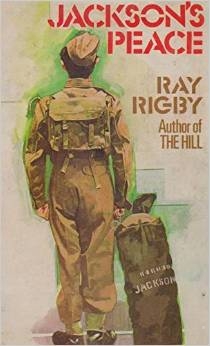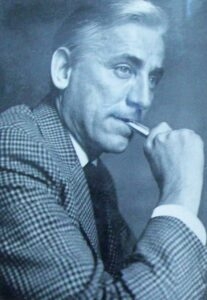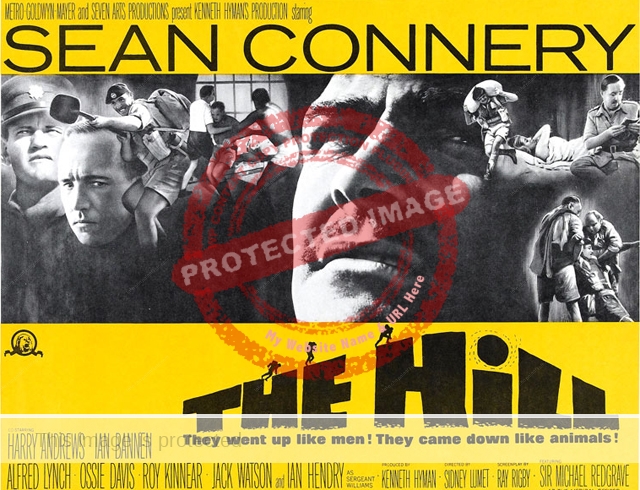English novelist and playwright Raymond “Ray” Rigby was born in Rochford, England, in 1916 and died in Guadalajara aged 78 on 19 May 1995.
In 1972, Rigby turned his back on a successful Hollywood career to move to Mexico. He lived initially in Jocotepec and for a short time in San Antonio Tlayacapan. He married María Cristina Quintero in Guadalajara in 1975. The couple lived in Jocotepec for several years before moving to the outskirts of Guadalajara in about 1980.
Rigby, who claimed to be a descendant of Saint John Rigby, one of 40 English martyrs canonized in 1970, had a troubled early life, doted on by his mother but abandoned by his father. It led to him finding it a challenge to form lasting partnerships, as evidenced by his five marriages, the last of which was by far the most successful. Rigby had five daughters, all born prior to his move to Mexico.
During the second world war, Rigby served as a private with the British Eighth Army in North Africa, but got into trouble due to various nefarious activities, and spent two spells in British field punishment centers. His experiences there would later form the basis for his award-winning novel The Hill, which he later turned into the famous anti-war movie of that name starring Sean Connery.
Rigby’s writing career began in 1948, when he began to write for television series, documentaries, radio and theatre. His greatest success came in the 1950s and 1960s, when he was employed as a screenwriter by MGM, 7 Arts, Warner Brothers, David Wolper Productions, Nat Cohen, 20th Century Fox, John Kohn Productions and Associated British Productions.
The screenplays and adaptations for numerous TV series and movies that Rigby worked on included: The End Begins (1956); Shut Out the Night (1958); Armchair Mystery Theatre (1960); The Avengers (1961); The Night of the Apes (1961); Operation Crossbow (1965) and his own masterpiece, The Hill (1965).
The Hill won the 1966 BAFTA Film Award for Best British Screenplay, the 1965 Best Screenplay at the Cannes Film Festival, and the 1966 Writers’ Guild of Great Britain Award for the Best British Dramatic Screenplay. It was translated into 13 languages and enjoyed a resurgence of interest following the break-up of the former Soviet Union.
 Rigby’s novels, several of which are largely autobiographical, were The Hill (1965); Where Have All The Soldiers Gone? (1966); Jackson’s War (1967); Jackson’s Peace (1974); Jackson’s England (1979); and Hill Of Sand (1981) (written as a sequel to The Hill).
Rigby’s novels, several of which are largely autobiographical, were The Hill (1965); Where Have All The Soldiers Gone? (1966); Jackson’s War (1967); Jackson’s Peace (1974); Jackson’s England (1979); and Hill Of Sand (1981) (written as a sequel to The Hill).
As can be seen from their publication dates, several of these novels were completed after Rigby moved to Mexico.
Rigby was always positive and cheerful and led a very disciplined life. He would “exercise” by walking round and round the small patio of his home on the outskirts of Guadalajara every morning for at least an hour, a habit possibly instilled during his spells in detention. He also had specific times set aside for writing and for socializing. He loved cooking and would watch and re-watch classic old Mexican movies. At the same time, he was one of the most gracious hosts imaginable, with a never-ending treasure chest of amazing experiences and stories. I first met him in about 1987 and we quickly became good friends. Indeed, it was Rigby who urged me to start writing and who provided moral support during my first struggling attempts, provided I visited him at a time when he wasn’t exercising or writing.
Rigby was a born raconteur, with keen street-smarts and a ready wit. Author Alex Grattan was not exaggerating when he described Ray in a memorial piece as a “world class wit and a fabulous story teller”.
While living in Jocotepec, Rigby had numerous run-ins with the local postmaster who was apparently accustomed at that time to check all incoming mail personally for any cash or valuables.
In 1973, Rigby and Wendell Phillips of Ajijic sold their joint script Ringer, written at Lakeside, to Universal Studios for a 90-minute pilot TV film. The two authors traveled to Hollywood to make the sale. This is almost certainly the last direct contact Rigby had with Hollywood.
Ray Rigby died in Guadalajara in 1995; his papers are in the Howard Gotlieb Archival Research Center at Boston University.
Note:
This post was first published in April 2015 and was revised in 2018. I owe a massive personal debt to Ray for having encouraged me to begin writing non-fiction articles about Mexico. Without his initial enthusiasm, none of my books (or this series of posts about artists and writers associated with Lake Chapala) would ever have seen the light of day.
Sources:
- Alex Gratton. Remembering Ray Rigby, El Ojo del Lago, July 1995
- Guadalajara Reporter, 16 Dec 1978, 23.
- Informador 6 August 1982, p 20-C
Sombrero Books welcomes comments, corrections or additional material related to any of the writers and artists featured in our series of mini-bios. Please use the comments feature at the bottom of individual posts, or email us.
Tony Burton’s books include “Lake Chapala: A Postcard History” (2022), “Foreign Footprints in Ajijic” (2022), “If Walls Could Talk: Chapala’s historic buildings and their former occupants” (2020), (available in translation as “Si Las Paredes Hablaran”), “Mexican Kaleidoscope” (2016), and “Lake Chapala Through the Ages” (2008).


Great story teller – both in print and face to face.
I am quoted in the above (and excellent) article as having written a piece about Ray Rigby for El Ojo del Lago, (chapala.com) the English-language magazine in Mexico, that was published soon after Ray’s passing in 1995. I am rather amazed that I am still the Editor-in-Chief of the magazine, and also quite delighted that Ray is still remembered. He was a world-class writer, and an even better human being—Alejandro Grattan, Ajijic, Jalisco, Mexico
Alex, Thanks for your positive comments. Ray was indeed a great guy, and there is no need for any degree of amazement, given how influential Ray was on my own fledgling writing career. Your own career is even more memorable, and your longevity and work as E-I-C of El Ojo equally outstanding. Hope to see you in March, Tony
Does anyone have any idea about the play which is credited in the film? If it’s still in print, it’s production history …etc. I can’t seem to find any evidence of it on line.
What information about “the play” is given in the credits?
Thanks very much for this heartfelt article. I have been able to find very little bio information on Ray. I am currently researching the story of another soldier, for his family, who spent time in a detention centre in North Africa and would be really interested in any details anyone has about who Ray served with in North Africa and which detention centres he was held in. I read and enjoyed The Hill as part of my research
Thanks, Andy, for your comments. I don’t know the answer to your question and neither do I know for sure if the material in Ray Rigby’s papers in the Howard Gotlieb Archival Research Center at Boston University include such information, but you may wish to contact them to check. If you do find out more about Ray Rigby in the course of your research, please do let us know.
what were the names of rays wives
Sorry, but I don’t have that information.
I met Ray in Majorca, Spain in the summer of 1967 shortly before I went into military service in the US. He hung out in a bar that I also frequented and we enjoyed many conversations together while listening to Procol Harum’s song Whiter Shade of Pale. I was 21 and had just graduated from college with aspirations to be a writer. He was already an accomplished screenwriter (I had seen and admired The Hill). He was very encouraging without knowing if I had any talent. Eleven books later (after a career in politics), I can say he was an inspiration to whom I will always be grateful. RIP, Ray
What a great memory. Thanks for sharing this. Ray remained positive and encouraging to the end. He was genuinely “one of a kind.”
I used to receive news of Ray from his letters to his brother, my father Conway in the 1990’s. After my father’s stroke left him unable to write, I took to corresponding directly with Ray and will always remember a line from his first letter in reply. “…marriage seems to have been something of a habit with me. However I no longer recommend it to my friends. It’s not that they keep getting worse, they just don’t get any better” He was married five times to my knowledge but notwithstanding the line I quote here, subsequent letters made it very clear that his last marriage was a happy one. I was told that Ray died peacefully in bed with a smile on his face.
I remember the smile well from the last time I saw him in about 1965.
Clive Rigby
Dear Clive,
Thanks for taking the time to write such a great comment about your uncle. I knew Ray quite well in his later years and I can well imagine him writing precisely that about his marriages, and you are correct that his last marriage was indeed a happy one. Ray was a great source of encouragement to me so I have very fond memories of our visits. If you can offer any basic biographical details about Ray’s life, I would love to learn more – please feel free to do so via email – infoATsombrerobooks.com Best wishes, Tony
Dear Clive and all
Jaquie your cousin and my older sister has beendesparately trying to make contact with you. She has unfortunately lost the photos and correspondence you gave her when she moved. Her email is jaqui.rigby@gmail.com. Or if anyone knows Clive’s contact please forward to my sister Jaqui You kindly gave her and her children a wonderful holiday in your Hong Kong home some years ago.
My friend has been researching into my family tree and found this obituary of Ray my father in early May 2020. My uncle John remembers him as a charming, entertaining charismatic man.
I Joanna am his 4th child, the only one who was never brought up by him. He left his first wife Kay and 2 children. Helen, who died only last December 4 weeks after a lung cancer diagnosis. Jaquie was with her and I had seen her that morning. Her brother died at a young age. When Jaquie was 6 and my mother Jean Theobald was pregnant with me(they never married but she changed her name to Rigby by deedpoll )he left her for Toni, a nurse 20 years his junior. They had 2 girls. He left Toni and them when they were 14 and 12. Throughout my life I never received a card or birthday present from him. My mother had adored him but had to take him to court for maintenance. He once took Jaquie and I to Hamleys when I was 7. I choose dolls house furniture which I still have. Jaquie and her 2 children visited him in Mexico once. She was upset when he died. I couldn’t shed a tear as I didn’t know him at all. However we did exchange 2 letters before he died. My husband and I had adopted a boy, we had 2 of our own children already. I felt it would be a good idea for me to make contact. He wrote back saying that he and Toni thought it would be a good idea not to have contact with me or Jaquie. What a different world we live in now where most men want to keep up and support their children. I have always referred to him as a serial monogamist. Did he basically get bored with each partner and the children. He didn’t seem to feel responsible for his children. I loved “The Hill”. But thank god that my husband of 44 years is a family man and we can enjoy our grandchildren together now.
I enjoyed reading everyone’s comment and memories of him. He was obviously very popular. But can I say lacking in moral fibre? However his father behaved in exactly the same way. Deserting Ray and Conway as small children. William Frederick Rigby finally settled in New Zealand with his third wife and died there 37 years later. Jaquie and I would be very happy to have any more photos and stories of Ray.
I remember my mother speaking of Ray. He was married to my aunt Tony does anyone know anything about their 2 daughters
Lorraine
I used to date one of Toni’s Daughters she was called Caroline, a qualified hairdresser, she was the younger of the two. Toni worked at Kingston Hospital and lived her daughters in a lovely flat in Kingston Hill, Surrey. That’s all i can remember from 46yrs ago.